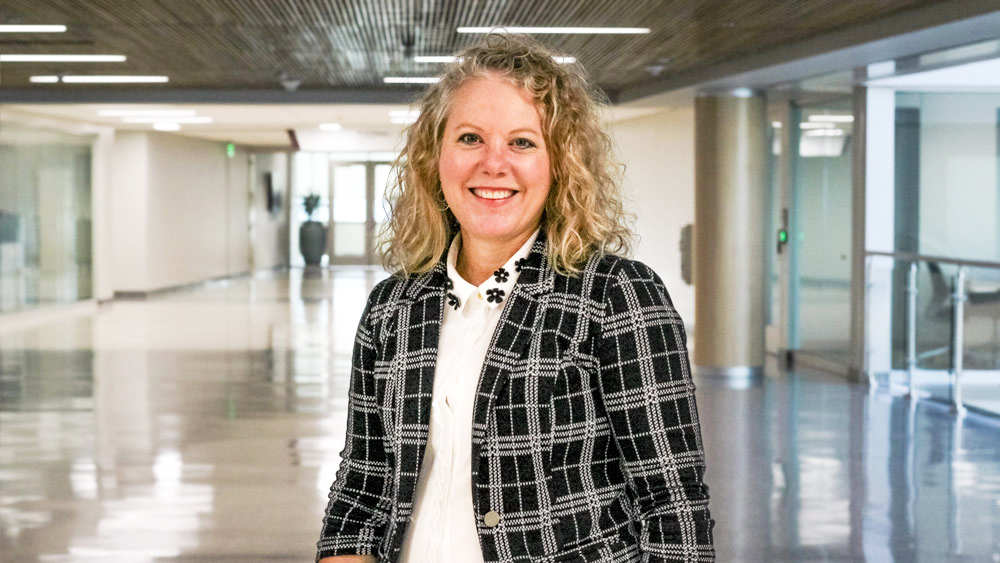
“Sitting in a small rural elementary school auditorium, with approximately 200 students encompassing grades K-5, I sat quietly, eagerly squinting at the large state-of-the-art, 35-inch color cathode ray tube television on stage streaming live the first space shuttle launch,” said Laurrie Cordes. “That small, slightly blurred image encouraged this timid, but curious and determined fifth-grader to be an astronaut.”
Cordes, a doctoral student in the Department of Ocean Engineering at Texas A&M University, earned her Bachelor of Science degree in aerospace engineering from Texas A&M in 1991. At the time, she was determined to pursue a career with the Aerospace Corporation in California.
“They didn’t hire undergrads,” Cordes said. “And since the aerospace field was in an economic downturn at the time, Dr. Allen convinced me to pursue my master’s degree with his guidance. That’s when I decided I wanted to be a professor.”
While studying under Dr. David Allen, now a senior lecturer in ocean engineering, Cordes learned just how much she enjoyed research, teaching and the whole academic environment. In an effort to add diversity to her education, she left Texas A&M after her master’s degree to pursue a Ph.D. at Northwestern University in theoretical and applied mechanics.
With an inevitable change of heart along the way, Cordes began applying for industry jobs and accepted a position with Stress Engineering Services (SES) in Houston, Texas, focusing in ocean and offshore-related projects. Unable to finish the research for her dissertation before the start date, she left Northwestern fully intending to see her project through.
“The pace of the work at SES was exciting and intense, not leaving much time for my dissertation, especially with a growing family and some obstacles with health issues,” Cordes said. “I decided to take a step back and focus on my family and my health.”
Though putting her degree on the back burner was a difficult decision, Cordes said it was the best decision for her and her family given the circumstances.
“My first project at Stress Engineering lasted four years: designing and analyzing the riser systems for a Spar platform,” Cordes said. “I was able to get intimately involved with the project from design to manufacturing to installation. It was fascinating.”
SES was the first time Cordes worked in the ocean environment, but she says there are many areas in which the two fields of aerospace and ocean are similar.
“They both deal with fluids: water and air,” she said. “Low-speed aerodynamics have the same fundamentals as hydrodynamics. By focusing and learning the engineering mechanics fundamentals, the transition was straightforward. And, working for a consulting company like SES that focused on applying engineering fundamentals to multiple industries, the job was stimulating.”
Cordes decided to resume her education and finish her Ph.D. under Allen in ocean engineering, 25 years after she received her master’s degree in aerospace engineering.
“We can either view this as I'm taking 25 years to do my Ph.D., or I'm starting over,” she said. “I consider it as I'm continuing my Ph.D. and finally completing that goal–showing my children it’s never too late to achieve your dreams, or even change your career path.”
Always determined to earn her Ph.D., she decided now was the perfect time to redirect her career toward academia–students and research.
“I thoroughly enjoyed my consulting job working with my colleagues and clients, but I find I get more satisfaction from working with students and being in an academic environment,” Cordes said. “You can see the ‘aha’ moment and know you impacted that student.”
Her love of learning translates easily to the research lab as she takes on projects from a different lens.
“Working with finite elements and computational mechanics is my focus,” she said. “My research as a Ph.D. student was on 3D nonlinear finite deformations. There are similar fundamentals exploring moisture infusion into foundations and substructure for ocean engineering coastal projects such as sea walls. Engineering is cross disciplinary and it’s exciting applying alternative approaches in investigating engineering problems.”
With an undeniable servant’s heart, students and faculty alike who collaborate with Cordes will learn that she genuinely enjoys learning and takes great pride in showing that everything is rooted in basic fundamental engineering concepts.
In addition to finishing her doctoral degree, Cordes will soon begin her teaching career as an assistant lecturer.
“I want to spend my next 30-plus years teaching and performing research in solid mechanics/ocean engineering, focusing on protecting coastal communities from rising oceans and extreme storm events and developing environmentally sustainable structural solutions,” she said. “I hope to inspire the next generation through my love for teaching and excitement for engineering. This is what I want to be my legacy.”